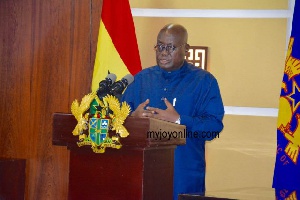The Chairman of United Bank for Africa (UBA), Tony Elumelu, has assured President Nana Addo Dankwa Akufo-Addo, of his bank’s support for the growth and development of the critical sectors of Ghana’s economy, as government seeks to return the nation back onto the path of progress and prosperity.
According to Elumelu, investor confidence in Ghana is rising, following the pro-business and pro-private approach taking by the government of President Akufo-Addo. This, coupled with policy initiatives announced in the 2017 budget, is making Ghana the investment destination in the region.
“We are very happy about all of this, and we would like to associate ourselves with your government and support you to succeed, both in banking and in other sectors of the economy,” he said.
The UBA Chairman made these known on Monday, March 13, 2017, when he paid a courtesy call on President Akufo-Addo, at the Presidency, to congratulate him on his victory in the December 2016 elections.
With UBA engaged in other ventures such as real estate, hospitality, oil and gas, and the generation of power, and with 30 branches in Ghana, Tony Elumelu noted that the bank is the biggest generator of electricity in Nigeria today. He also recounted how, during the era of the Mahama administration, UBA supported government to the tune of $1.1 billion.
On the government’s 1-District-1-Factory policy, the UBA Chair indicated that his bank was prepared to support government in the realization of this vision, as well as help in boosting the country’s revenue generation.
“Africa lacks economic independence, and people like you, Mr. President, can provide the new hope for Africa and we will stand by you. You have in us willing and capable partners who are proud and happy to identify themselves with you,” he added.
On his part, President Akufo-Addo expressed his gratitude for the visit of the UBA Chair, stating that “we are all in admiration of the work you’ve been doing, not just concentrating on Nigeria, but, looking beyond the borders to countries like Ghana and beyond.”
With UBA being the first Nigerian bank to set up in Ghana, during the era of President Kufuor, largely as a result of the positive business atmosphere created in the country, President Akufo-Addo noted that he was keen on recreating a pro-business climate in Ghana to spur on development.
“We came in because the economy of our country had taken a nose dive, and there was the need for a new direction. Our first task is to revive our economy, and put it on the road to growth and expansion.
It is only by growing our economy that we can solve the problems of our economy, principally youth unemployment. We want to grow our industry and our agriculture, and have a solid financial system that will support the growth of these two sectors,” he said.
For this reason, President Akufo-Addo noted that “UBA is the kind of partner that we are looking for to assist us in the delivery of our vision and mandate.”
He assured that neither his government nor his appointees are in office to compete with business men, reiterating that “they are in office to facilitate and increase business confidence in Ghana, and, by that way, develop the country rapidly.”
The President continued, “The Ghanaian private sector is the way forward for us. Our first budget has pointed the way we are going to handle the private sector. We have removed the many impediments there are for businesses. We want to signal to the private sector that we mean business.
We are counting on UBA to have a good understanding of where we are going, and be in a good position to fund some of these critical developments in industry and agriculture.”
Sounding optimistic about the Ghana’s future, President Akufo-Addo told the UBA Chair that “we want to build a Ghana beyond aid. We are tired of being beneficiaries of handouts and charity.
We want to be able to stand on our own two feet and deal with our issues ourselves.”
Business News of Tuesday, 14 March 2017
Source: starrfmonline.com
Akufo-Addo provides 'new hope' – UBA boss
Business
















